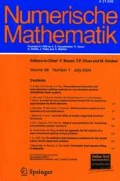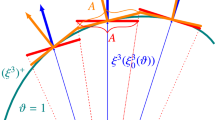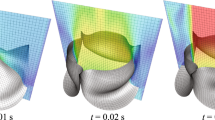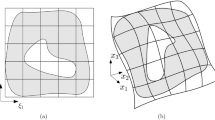Abstract
We develop and analyze an ultraweak variational formulation of the Reissner–Mindlin plate bending model both for the clamped and the soft simply supported cases. We prove well-posedness of the formulation, uniformly with respect to the plate thickness t. We also prove weak convergence of the Reissner–Mindlin solution to the solution of the corresponding Kirchhoff–Love model when \(t\rightarrow 0\). Based on the ultraweak formulation, we introduce a discretization of the discontinuous Petrov–Galerkin type with optimal test functions (DPG) and prove its uniform quasi-optimal convergence. Our theory covers the case of non-convex polygonal plates. A numerical experiment for some smooth model solutions with fixed load confirms that our scheme is locking free.

Similar content being viewed by others
References
Arnold, D.N., Madureira, A.L., Zhang, S.: On the range of applicability of the Reissner-Mindlin and Kirchhoff-Love plate bending models. J. Elast. 67(2002), 171–185 (2003)
Babuška, I., Pitkäranta, J.: The plate paradox for hard and soft simple support. SIAM J. Math. Anal. 21, 551–576 (1990)
Beirão da Veiga, L., Mora, D., Rodríguez, R.: Numerical analysis of a locking-free mixed finite element method for a bending moment formulation of Reissner-Mindlin plate model. Numer. Methods Part. Differ. Equ. 29, 40–63 (2013)
Bösing, P.R., Carstensen, C.: Weakly over-penalized discontinuous Galerkin schemes for Reissner-Mindlin plates without the shear variable. Numer. Math. 130, 395–423 (2015)
Braess, D., Sauter, S., Schwab, C.: On the justification of plate models. J. Elast. 103, 53–71 (2011)
Calo, V.M., Collier, N.O., Niemi, A.H.: Analysis of the discontinuous Petrov-Galerkin method with optimal test functions for the Reissner-Mindlin plate bending model. Comput. Math. Appl. 66, 2570–2586 (2014)
Carstensen, C., Demkowicz, L.F., Gopalakrishnan, J.: Breaking spaces and forms for the DPG method and applications including Maxwell equations. Comput. Math. Appl. 72, 494–522 (2016)
Chapelle, D., Stenberg, R.: An optimal low-order locking-free finite element method for Reissner-Mindlin plates. Math. Models Methods Appl. Sci. 8, 407–430 (1998)
Demkowicz, L.F., Gopalakrishnan, J.: Analysis of the DPG method for the Poisson problem. SIAM J. Numer. Anal. 49, 1788–1809 (2011)
Demkowicz, L.F., Gopalakrishnan, J.: A class of discontinuous Petrov-Galerkin methods. Part II: Optimal test functions. Numer. Methods Part. Differ. Equ. 27, 70–105 (2011)
Führer, T., Haberl, A., Heuer, N.: Trace operators of the bi-Laplacian and applications, IMA J. Numer. Anal. (2019). https://doi.org/10.1093/imanum/draa012
Führer, T., Heuer, N.: Fully discrete DPG methods for the Kirchhoff-Love plate bending model. Comput. Methods Appl. Mech. Eng. 343, 550–571 (2019)
Führer, T., Heuer, N., Niemi, A.H.: An ultraweak formulation of the Kirchhoff-Love plate bending model and DPG approximation. Math. Comput. 88, 1587–1619 (2019)
Girault, V., Raviart, P.-A.: Finite Element Methods for Navier-Stokes Equations. Springer Series in Computational Mathematics, vol. 5. Springer-Verlag, Berlin (1986)
Gopalakrishnan, J., Qiu, W.: An analysis of the practical DPG method. Math. Comput. 83, 537–552 (2014)
McLean, W.: Strongly Elliptic Systems and Boundary Integral Equations. Cambridge University Press, Cambridge (2000)
Niemi, A.H., Bramwell, J.A., Demkowicz, L.F.: Discontinuous Petrov-Galerkin method with optimal test functions for thin-body problems in solid mechanics. Comput. Methods Appl. Mech. Eng. 200, 1291–1300 (2011)
Schwartz, L.: Théorie des distributions, Publications de l’Institut de Mathématique de l’Université de Strasbourg, No. IX-X, Hermann, Paris (1966)
Ventsel, E., Krauthammer, T.: Thin Plates and Shells. CRC Press, New York (2001)
Author information
Authors and Affiliations
Corresponding author
Additional information
Dedicated to our dear friend Francisco “Pancho” Javier Sayas who passed away in April 2019.
Publisher's Note
Springer Nature remains neutral with regard to jurisdictional claims in published maps and institutional affiliations.
Supported by CONICYT through FONDECYT Projects 1190009, 11170050, and by NSF through Grant DMS-1818867.
Rights and permissions
About this article
Cite this article
Führer, T., Heuer, N. & Sayas, FJ. An ultraweak formulation of the Reissner–Mindlin plate bending model and DPG approximation. Numer. Math. 145, 313–344 (2020). https://doi.org/10.1007/s00211-020-01116-0
Received:
Revised:
Published:
Issue Date:
DOI: https://doi.org/10.1007/s00211-020-01116-0




